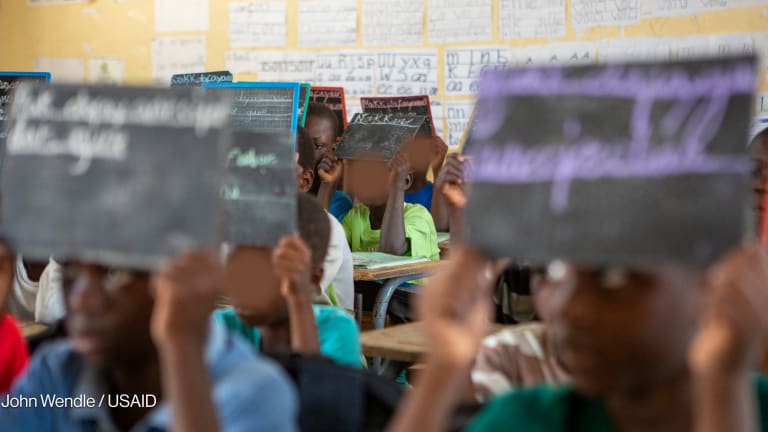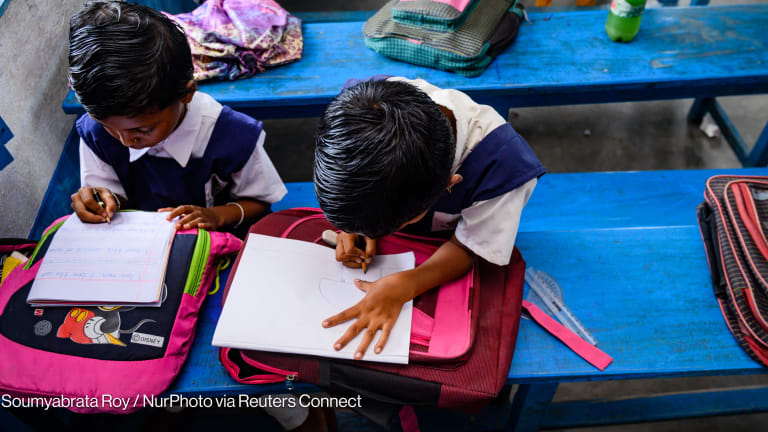
DUBAI, United Arab Emirates — A Kenyan teacher has won a prestigious $1 million education prize, saying it shows that teachers in lower-income countries can use “the little [they] have … to do great things.”
The Global Teacher Prize aims to raise the status of the profession by creating a “Nobel Prize” for teaching, in an effort to address what experts are describing as a “global learning crisis.”
“I am only here because of what my students have achieved. This prize gives them a chance. It tells the world that we can do anything.”
— Peter Tabichi, 2019 winner of the Global Teacher PrizeThis year’s prize was awarded to Peter Tabichi, who teaches science and mathematics at a secondary school in a remote village in Kenya, during a star-studded ceremony at the Global Education & Skills Forum in Dubai, United Arab Emirates, over the weekend.
It is the first time the five-year-old prize has gone to a teacher from a low-income country. Both the prize and the forum are funded by the Varkey Foundation, the philanthropic arm attached to the international GEMS private school chain.
GESF: What to watch at the 'Davos of education'
As 3,000 leaders and advocates head to Dubai for the Global Education & Skills Forum 2019, Devex rounds up the topics to keep an eye on.
Tabichi was named the winner by actor Hugh Jackman, beating off competition from nine other teachers from countries including India, Brazil, Japan, the United Kingdom, and United States.
“This prize does not recognize me but recognizes this great continent’s young people. I am only here because of what my students have achieved. This prize gives them a chance. It tells the world that we can do anything,” Tabichi said in a press release.
Asked by Devex after the ceremony what it takes to be a great teacher, he added: “It’s about creativity and using efficient methods of teaching … You can use the little you have within the environment, [such as] local materials, to do great things,” pointing to a project by some of his students to produce electricity from local plants.
Kenya’s President Uhuru Kenyatta also congratulated Tabichi in a video message screened during the ceremony.
The need to recruit, retain, and support more and better teachers was a recurrent theme during this year’s forum, which was attended by 1,700 participants, including 30 current and former education ministers.
Most experts agree that improving the teacher workforce is integral to improving learning outcomes for students. The UNESCO Institute for Statistics recently estimated that 262 million school-age children are out of school and that millions more are in school but learning little. The teacher shortage is especially dire in lower-income countries, many of which are also experiencing unprecedented population growth. Demand for teachers in low-income countries will nearly double by 2030, according to the Education Commission.
The 36-year-old Kenyan teacher is also a Franciscan brother and donates 80 percent of his salary to his local community. He comes from a family of teachers and started his career working in a private school but left to join Keriko school in Pwani village, situated in a remote, semi-arid part of Kenya’s Rift Valley. The majority of the school’s pupils are from poor families and almost a third are orphans. The school has one computer and there are 58 students per teacher, according to a press release.
ICYMI: 'Nobel prize for teaching' shines spotlight on innovative methods
The 2018 prize was awarded to Andria Zafirakou, a London inner-city school teacher, for her work to reach marginalized pupils, often from ethnic minorities.
Despite these challenges, Tabichi has helped his students excel. The school recently came first among public schools in a national science fair and the number of pupils going on to university and college has also increased.
Andreas Schleicher, founder of international education ranking system the Program for International Student Assessment, or PISA, said the prize has succeeded in raising the status of the teaching profession.
“All of the prize winners are amazing people, but the point is there are lots of those people in the profession who we do not see because we isolate teachers in the classroom and school has become almost like a commodity … You send your child there and you expect to get something back. We do not value the teachers in the same we value other professions. That’s why I support this prize, it’s very much needed,” he said.
Tabichi’s win shows that “amazing teachers who under very difficult conditions … change the world,” Schleicher added.
It also helps to challenge misconceptions about the correlation between wealth and educational attainment, Schleicher said. For example, PISA data reveals that the most disadvantaged students from Shanghai perform as well as the wealthiest Americans.
The teaching profession is now tougher than ever according to Jaime Saavedra, head of education at the World Bank and former education minister for Peru. Speaking during one of the forum’s panel sessions, Saavedra said the role of the teacher today is less about knowledge and more about critical thinking, which makes it a “much more complicated … profession than it was before.”
Lucy Lake, CEO at the Campaign for Female Education, an NGO working on girl’s education, said awards and celebrations of teachers — of which the Global Teacher Prize is the highest-profile example — can be effective at “shifting the narrative” around teaching. CAMFED has also been working with governments in a number of African countries on ways of “rewarding and celebrating teachers who are actively bringing people back into the school system who might have been excluded,” she told Devex.








